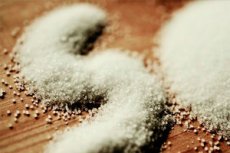Medical expert of the article
New publications
Food salt poisoning
Last reviewed: 04.07.2025

All iLive content is medically reviewed or fact checked to ensure as much factual accuracy as possible.
We have strict sourcing guidelines and only link to reputable media sites, academic research institutions and, whenever possible, medically peer reviewed studies. Note that the numbers in parentheses ([1], [2], etc.) are clickable links to these studies.
If you feel that any of our content is inaccurate, out-of-date, or otherwise questionable, please select it and press Ctrl + Enter.

Salt is a white powder with a characteristic salty taste. It is a well-known chemical compound, which is represented by sodium and chlorine ions. It has the ability to react in the human body and cause various reactions. It often causes poisoning. As a result of the reaction, new substances, ions, can be formed, which do not always have properties that are beneficial for the body. The substance is dangerous not only for humans, but also for animals in large quantities. However, without it, the normal functioning of the body is also impossible.
The main property is the ability to bind water. A chemical reaction occurs, which is accompanied by the formation of sodium ions. A large accumulation of sodium ions in the body disrupts the water balance of the blood. This has negative consequences for the body as a whole. The main metabolic processes and biochemical parameters are disrupted. Fluid retention in tissues appears, their swelling develops. The danger is also that there is an active displacement of potassium salts from erythrocytes. This entails a violation of the nervous and endocrine status, the regulation of basic functions is disrupted.
Symptoms salt poisoning
It manifests itself as pain in the stomach and intestines. The danger of poisoning is that salt retains fluid in the body, as a result of which the water-salt balance is disrupted, normal biochemical indicators are disrupted. The consequence is severe swelling of tissues and internal organs.
The second negative effect of salt on the body is that excessive accumulation of salt leads to disruption of normal digestion. The walls of the stomach and intestines become irritated, the osmotic pressure of the blood increases, and the blood pressure in the vessels changes. This creates additional stress on the heart, kidneys, and liver.
Complications and consequences
Not only acute, but also chronic salt poisoning is dangerous, during which metabolic processes are disrupted, and blood pressure increases systematically. This ends with the development of persistent hypertension. The most dangerous complication of this disease is stroke, myocardial infarction. Excessive accumulation of salt in the body can lead to the development of osteoporosis and even stomach cancer. In addition, intraocular pressure increases significantly, which leads to various eye pathologies and decreased vision.
Who to contact?
Treatment salt poisoning
The essence of the treatment is to prescribe means aimed at neutralizing the salt, its removal from the body. Gastric lavage is performed, sorbents are used. Drinking plenty of fluids is recommended. Symptomatic and supportive therapy is performed. An important component of the treatment is the inclusion of milk, homeopathic remedies and herbal decoctions in the diet.Calcium chloride or calcium gluconate is necessarily administered intravenously. In case of cardiac dysfunction, it is recommended to treat with caffeine and other drugs.
First aid consists of giving the person a large amount of water to drink. This will eliminate the signs of dehydration. You need to induce vomiting, which will help get rid of the effects of intoxication, eliminate excess salt from the body, and prevent its further absorption. Then you need to wash out the stomach. This should be done in a medical facility, so when the first signs of poisoning appear, you need to call an ambulance as soon as possible. Various medications and a light solution of manganese are used for washing.
After this, the victim is laid down, covered warmly and given an enveloping agent to drink, which will restore the mucous membranes and prevent further absorption of salt. Kissel, oat broth, milk, and raw egg are good. If necessary, sorbents are prescribed, and supportive and restorative therapy is carried out. For about 3-4 days, food should be completely without salt. A strict diet must be followed.
Prevention
In order to avoid poisoning, you should not abuse salt. Women should pay special attention to this during pregnancy, since sensitivity to salt and other chemicals decreases. Therefore, pregnant women often oversalt their food, which is the cause of many pathologies, ranging from edema to severe gestosis and premature birth.


 [
[